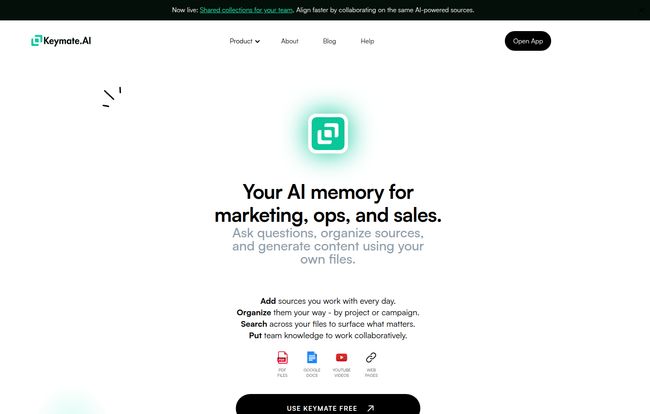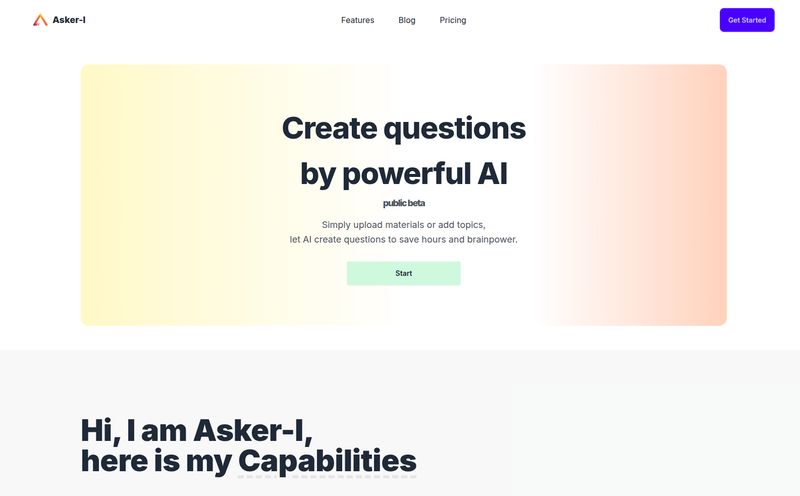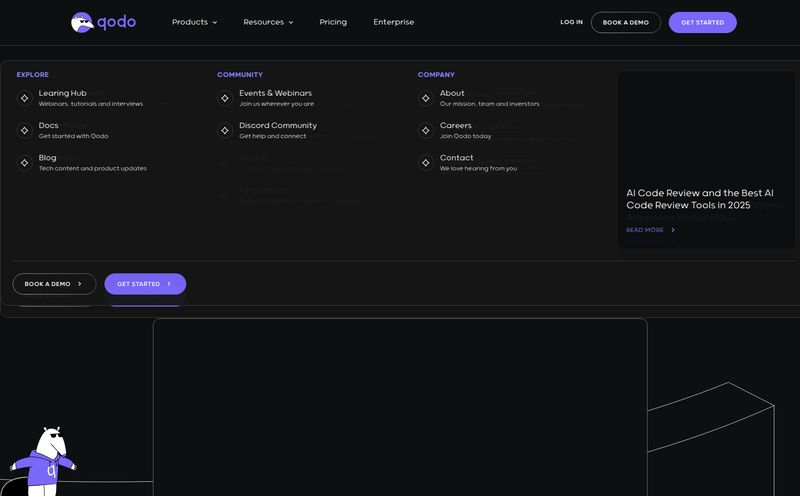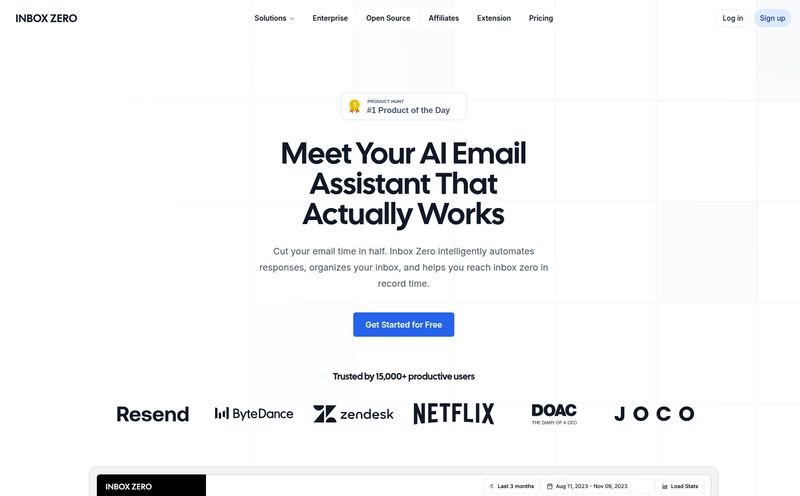If you work in marketing, SEO, or pretty much any knowledge-based field, your digital life is a mess. Mine certainly is. I’ve got a bookmarks bar that looks like a dragon's hoard, a desktop littered with rogue PDFs, and a Google Drive that’s more of a black hole than an organized system. I have notes in Notion, half-thoughts in Google Keep, and a hundred YouTube videos saved to ‘Watch Later’ that I will, in fact, not watch later.
For years, we’ve been chasing the dream of a “second brain.” A perfect, digital extension of our own minds where every piece of information is instantly retrievable. I’ve tried everything. The complex folder structures. The elaborate tagging systems. Nothing ever sticks. It’s too much manual work.
But then AI started getting… well, good. And I started wondering if the solution wasn't better organization, but better retrieval. What if I could just dump all my stuff into one place and have an AI assistant that could make sense of it for me? That’s the promise of a whole new class of tools, and the one that recently caught my eye is Keymate.AI. I’ve been playing with it for a few weeks, and, well, I have some thoughts.
So, What is Keymate.AI, Really?
Forget the jargon for a second. At its heart, Keymate.AI is like hiring a personal librarian for your AI. You know how you can ask ChatGPT a general question and it gives you a general answer from its vast, public knowledge? That's great for trivia, but not so great when you need an answer based on your specific project files, your client's data, or your curated research.
Keymate lets you create these little private memory banks, which they call ‘Keys.’ You feed a Key with all your relevant stuff—web links, PDFs of industry reports, Google Docs with your notes, even YouTube video transcripts. Then, you can have a conversation with that specific Key. It’s like having a version of ChatGPT that has actually done the reading you were supposed to do.

Visit Keymate.AI
Getting Started With Your First 'Key'
The onboarding is refreshingly straightforward. You create an account, and the main dashboard prompts you to create your first ‘Key.’ Think of a Key as a project folder on steroids. For my first one, I decided to tackle a big content audit I was working on for a client in the B2B SaaS space.
I started feeding it: a dozen or so links to top-ranking competitor articles, our own Google Analytics export as a PDF, a few Google Docs with my initial strategy notes, and even a link to a YouTube tutorial on a new analytics technique I wanted to try. The platform just gobbles it all up. The process feels less like filing paperwork and more like stocking a pantry. You just put the ingredients on the shelf, knowing your AI chef can find them later.
My Favorite Keymate.AI Features
A tool can have a great concept, but it’s the execution that matters. Here’s what actually impressed me during my day-to-day use.
The AI-Powered Memory is a Game Changer
This is the core of it all. The ability to ask, “Based on the competitor analysis PDFs and my strategy notes, what are the top three content gaps we should prioritize?” and get a coherent, synthesized answer is just… chef’s kiss. It’s not just pulling keywords. It’s connecting concepts across different documents. This is made possible by a pretty generous 128K context window, which, for the nerds out there, means it can hold a lot of information in its short-term memory while it formulates a response. It’s the difference between an assistant who read the book report and one who read the entire book.
Source Management That Actually Works
I’ve tried so many bookmark managers and read-it-later apps. They all become graveyards for good intentions. Because Keymate’s organization is tied to a purpose—chatting with the AI—I found myself actually using it. Creating a Key for ‘Q3 Marketing Campaign’ and another for ‘New SEO Strategies’ feels so much more intuitive than a generic folder structure. It’s organization driven by action, not just archival.
Taming ChatGPT's Hallucinations
We've all been there. You ask an AI a specific question and it confidently makes something up. This is a massive problem for professional work. Because Keymate grounds its answers in the specific documents you provide, the risk of these “hallucinations” drops dramatically. It’s forced to color inside the lines you’ve drawn. When I asked it about my client's bounce rate, it pulled the number from the PDF I uploaded, it didn’t just guess a plausible number. For anyone using AI for serious research, this is a huge trust builder.
Beyond Just Chat: Automation and Integration
This is where things get really interesting for power users. Keymate isn’t just a closed-off system. It plugs into the wider world.
Connecting with Make.com
The integration with Make.com (formerly Integromat) opens up wild possibilities. You could, for instance, set up a scenario that automatically watches an RSS feed of your favorite industry blog. Every time a new article is published, Make.com could grab the URL, feed it to your ‘Industry News’ Key in Keymate.ai, and then even ask the AI to write a three-sentence summary and post it to a team Slack channel. The mind boggles a bit.
The ChatGPT Plugin
For those of us already living inside ChatGPT, Keymate offers a plugin. This means you don’t have to switch between tabs. You can stay in your familiar ChatGPT interface and just tell it to use your Keymate memory for a specific query. It’s a small thing, but it removes a layer of friction, which I always appreciate.
The Elephant in the Room: Keymate.AI Pricing
Alright, let’s talk money. Every great tool comes with a price tag. Keymate.AI has a tiered system, and I have to admit, the pricing page I saw was a little… odd, with multiple tiers listed at the same annual price. This might be temporary beta pricing or an error, so I’d recommend checking the live site for the most current info. But here’s the breakdown of the plans as I saw them:
| Plan | Key Features | Best For |
|---|---|---|
| Essential (Free) | Basic browsing, Keymate Search, Knowledge Base Training. Contains ads. | Dipping your toes in and seeing if the workflow fits you. |
| Bronze Yearly | Human-Mimic Browsing, Private Memory Building, Multiple PDF Search. | Individuals and researchers who need to work with private documents. |
| Silver/Gold Yearly | Adds features like an AI copilot, deeper insights, and one-click reports. | Marketing professionals and analysts needing faster insights. |
| Platinum Yearly | All features, plus Make.com automation, Ultrafast Model, and dedicated support. | Power users, agencies, and teams who want to fully automate their research workflows. |
The free plan is genuinely useful for getting a feel for the platform. For professionals, the value of the paid plans really depends on how much time you spend wrangling information. For me, the time saved by not having to re-read three different reports to find one stat is easily worth the cost of a few coffees a month.
Where It Could Be Better
No tool is perfect. While I’m pretty bullish on Keymate, there are a few things to keep in mind. First, there’s a bit of a learning curve to unlock the truly advanced stuff, like the Make.com automations. It's not plug-and-play, you have to invest a little time. Also, its main strength is its deep integration with ChatGPT. If you're a die-hard Claude or Gemini user, this might feel a bit restrictive, though I suspect wider model support is on the roadmap for many tools like this.
Who is Keymate.AI Actually For?
I see a few groups getting a ton of value out of this:
- Content Marketers & SEOs: Juggling competitor research, keyword data, analytics reports, and content briefs? This is a no-brainer.
- Academic Researchers & Students: Imagine feeding it all your research papers, lecture notes, and textbook chapters for a single course. Studying would be transformed.
- Business Analysts & Consultants: Quickly get up to speed on a new client by feeding Keymate their annual reports, market data, and internal documents.
Basically, if your job involves synthesizing information from multiple digital sources, this is built for you.
Frequently Asked Questions
- What is a 'Key' in Keymate.AI?
- Think of a Key as a smart, project-specific folder. It's a container where you put all your sources (links, files, etc.) on a particular topic so you can chat with the AI about just that information.
- Can I use Keymate.AI for free?
- Yes, there's an 'Essential' plan that's free to use. It's supported by ads and has some feature limitations, but it's a great way to try out the core functionality.
- Is my data safe with Keymate.AI?
- They take security pretty seriously. The website mentions using a secure cloud infrastructure and being compliant with the SOC 2 Type 2 industry standard, which is a strong indicator of good data-handling practices.
- What kind of files can I upload?
- It supports a wide range of formats, including web pages (by just pasting the link), PDFs, Google Docs, and even YouTube videos (it analyzes the transcript).
- How is this different from just using standard ChatGPT?
- Standard ChatGPT has general world knowledge up to its last training date. Keymate gives ChatGPT a custom, private memory based on the specific files and links you provide. It answers questions based on your data, not the open internet.
Final Thoughts: Is This My New Second Brain?
After a few weeks, I can say Keymate.AI has carved out a permanent spot in my workflow. It hasn’t magically cleaned my desktop, but it’s changed how I approach research. I’m spending less time searching for files and more time asking interesting questions.
It’s not a passive filing cabinet; it’s an active research partner. It's the closest thing I've found to that elusive “second brain” that doesn't require a PhD in productivity systems to maintain. If you feel like you’re drowning in data and need a smarter way to stay afloat, I’d say give the free plan a spin. You might be surprised at how much smarter your AI assistant can be when it’s read your notes.



